LGBTQ+ Community & Advocate Survey Overview
Introduction
The LGBTQ+ civil rights movement has seen significant victories over the past two decades, in courthouses, legislatures, and the public sphere. From the beginning of the 2000s to now, advocates have successfully challenged anti-sodomy laws, protected the right to same-sex marriage, and secured federal LGBTQ+-inclusive antidiscrimination protections in the workplace, obtaining landmark rulings from the U.S. Supreme Court recognizing the rights of LGBTQ+ people.1 At the same time, some state lawmakers have increased the number of LGBTQ+-inclusive legal protections in state law by passing specific legislation, as well as comprehensive anti-discrimination statutes and ordinances.2 And social acceptance of the LGBTQ+ community is on the rise, with a majority of the United States public supporting laws that would protect LGBTQ+ people from discrimination.3
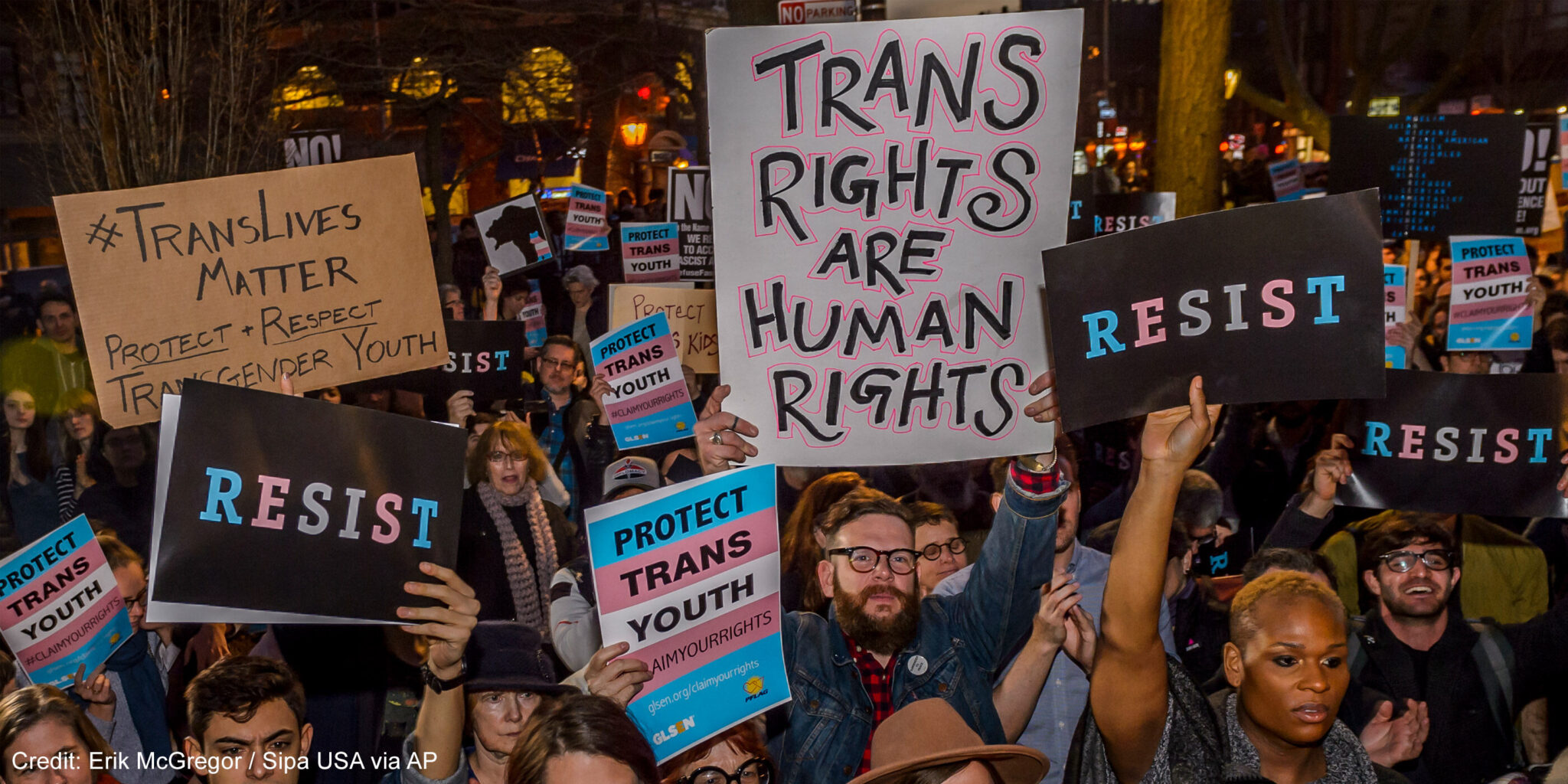
However, as the visibility and success of the LGBTQ+ rights movement increased, backlash has occurred in the form of attacks—both legislative and literal—on the LGBTQ+ community. Reports show that the number of anti-LGBTQ+ bills introduced across the country ballooned from 41 bills in 2018 to 238 bills in the first three months of 2022. And of those 238 bills introduced in 2022, nearly half targeted transgender people specifically.4 It is unsurprising, then, that anti-trans violence and rhetoric is on the rise across the country—with the past two years being the deadliest for transgender people in recent history.5 This hostile social and political climate is fueled by a resurgence of demeaning rhetoric about queer and trans people and a significant increase in the number of anti-LGBTQ+ hate groups across the country.6
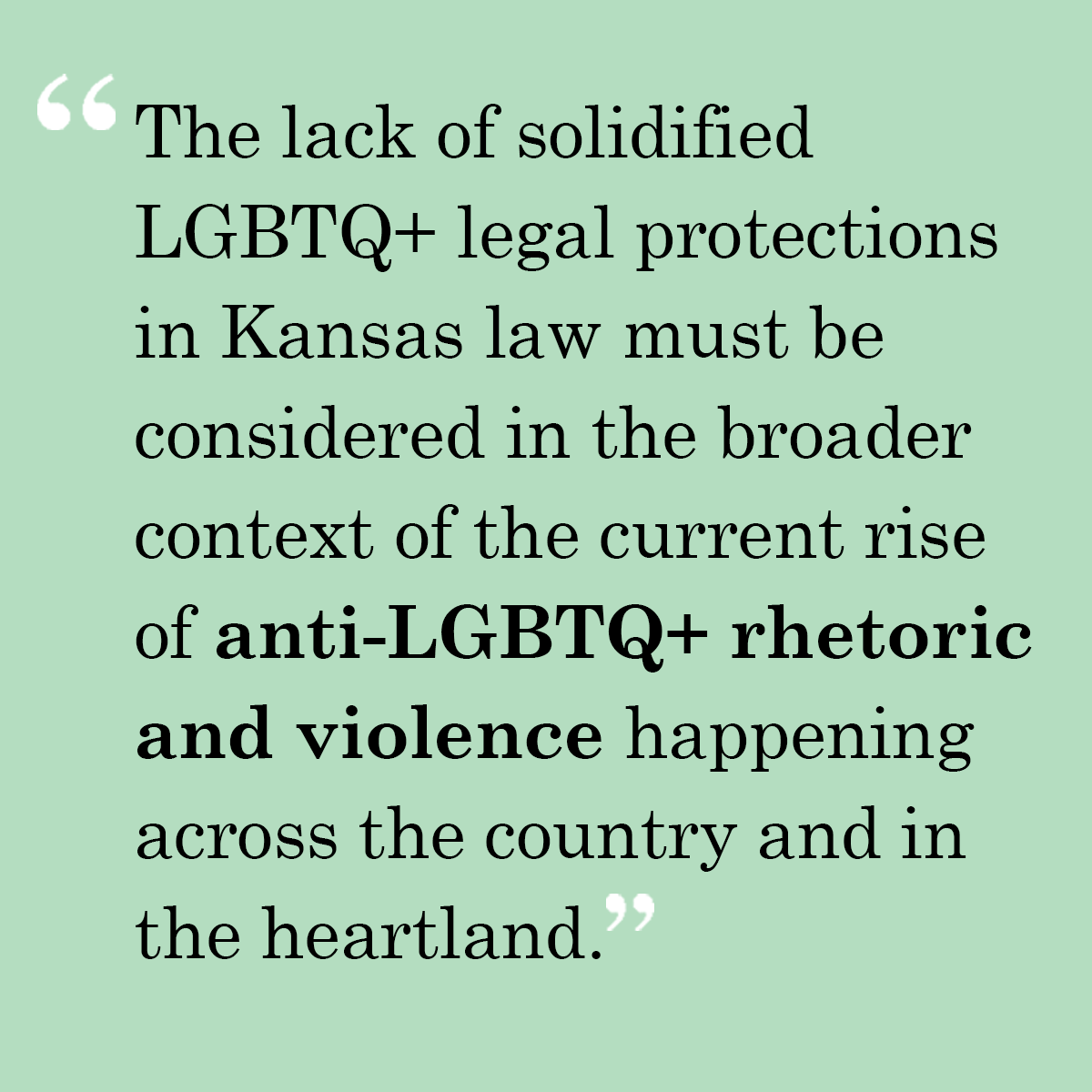
In Kansas, anti-LGBTQ+ sentiment has shown up everywhere—including in the state legislature, in local governance, at school board meetings, and in political campaigns.7 This is troubling, considering Kansas is home to over 92,000 LGBTQ+ people.8 And the data shows that this anti-LGBTQ+ sentiment has real and harmful impacts on LGBTQ+ Kansans. LGBTQ+ people—but especially transgender people—report experiencing disproportionately high rates of discrimination in employment, housing, public accommodations, and other settings in Kansas.9 This results in LGBTQ+ Kansans experiencing worse socioeconomic outcomes than their heterosexual and cisgender counterparts, and ultimately leads to disproportionately high rates of unhoused queer and trans youth.10 The recent increase in anti-LGBTQ+ rhetoric and legislative attacks on trans youth in Kansas has additional implications—with research showing that this kind of hostile community debate negatively impacts trans youths’ mental health.11
And while the LGBTQ+ civil rights movement has seen significant progress in the past two decades, LGBTQ+ Kansans are still vulnerable to discrimination and other civil rights violations. While the U.S. Supreme Court held that LGBTQ+ people are protected from discrimination in employment under Title VII, the Court has not yet issued similar holdings for other federal civil rights laws. That is to say, federal law does not explicitly protect LGBTQ+ people from discrimination in housing, education, or public accommodations. And in Kansas, although the state antidiscrimination law is currently interpreted to protect LGBTQ+ people from discrimination in employment, housing, and public accommodations, that interpretation could change at any time. The text of Kansas’ antidiscrimination statute does not explicitly protect LGBTQ+ people,12 and efforts to revise the statute accordingly have consistently failed in the Kansas Legislature. The lack of solidified LGBTQ+ legal protections in Kansas law must be considered in the broader context of the current rise of anti-LGBTQ+ rhetoric and violence happening across the country and in the heartland. To that end, the ACLU of Kansas connected with LGBTQ+ Kansans and organizations working closely with the LGBTQ+ population to hear about the challenges they are facing and identify their unaddressed needs. In the Fall of 2022, the ACLU of Kansas launched its first informal LGBTQ+ community and advocate needs assessment survey.
Nearly 100 LGBTQ+ Kansans and advocates from 13 Kansas counties, from Ford to Wyandotte, responded to our survey, answering questions about LGBTQ+ Kansans experiences with discrimination, their level of community support and safety, and their greatest fears or concerns. All responses were anonymous.
Research Methods, Strengths, and Limitations
The data for this needs assessment survey was obtained from responses to an online survey form, completed directly by LGBTQ+ Kansans or advocates for LGBTQ+ Kansans across the state. The survey was administered in November and December of 2022 and was available online in both English and Spanish. The survey was an informal needs assessment, targeting specific areas of potential need related to the legal rights of LGBTQ+ Kansans and the ACLU of Kansas’ civil rights work. As such, the survey was underinclusive of the full range of needs and issues that may be impacting LGBTQ+ Kansans. Further, while the survey was shared statewide, it was mostly disseminated and publicized through ACLU of Kansas’ advocate networks.
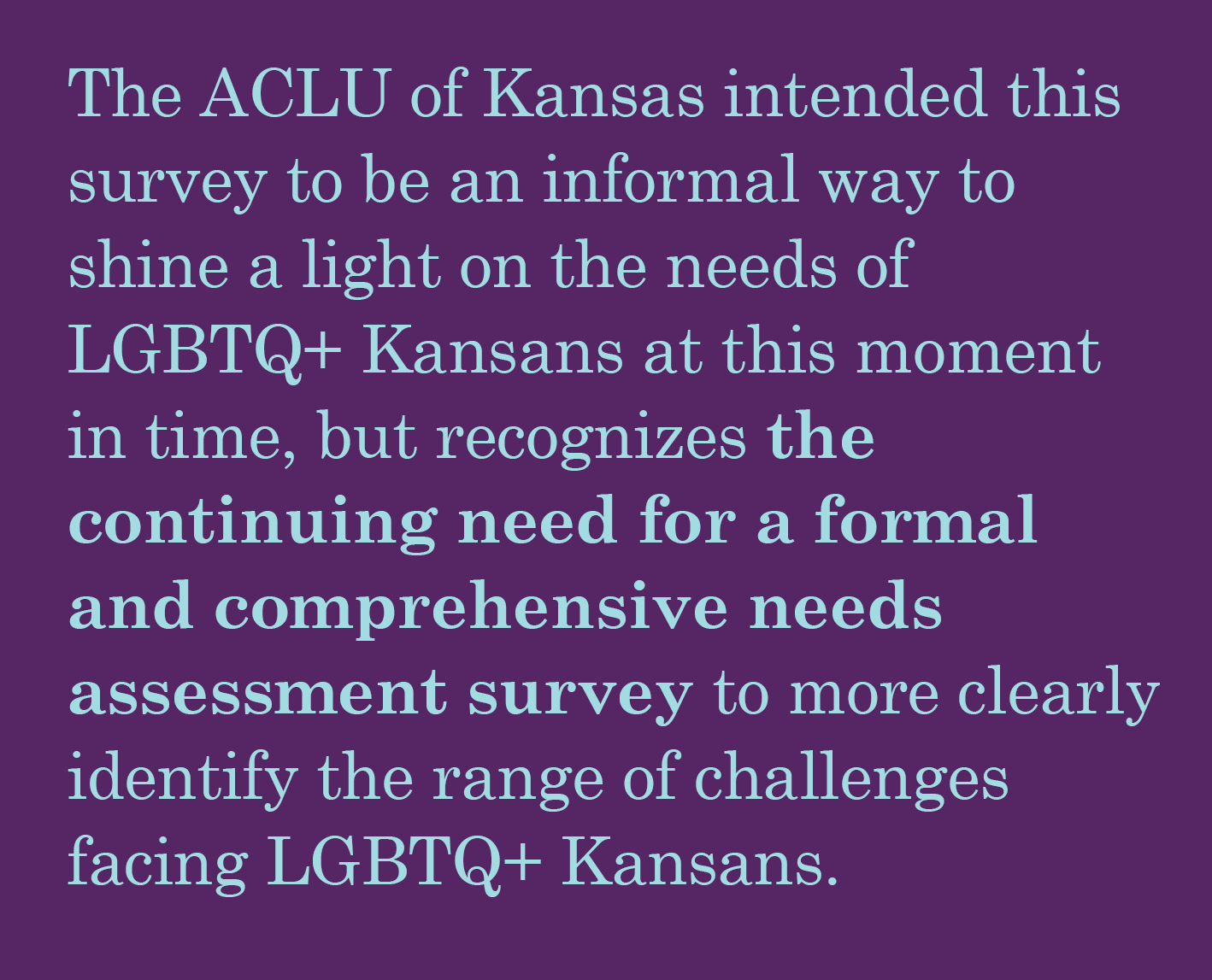
Thus, survey participants were likely to be connected to LGBTQ+ organizations or services, reducing the survey’s availability to more isolated community members (such as marginally housed or unhoused community members, those in very rural areas without internet connection, or those who are currently incarcerated), which means the findings inevitably understate certain needs. The ACLU of Kansas intended this survey to be an informal way to shine a light on the needs of LGBTQ+ Kansans at this moment in time, but recognizes the continuing need for a formal and comprehensive needs assessment survey to more clearly identify the range of challenges facing LGBTQ+ Kansans.
Summary of Findings
Experiences of Discrimination
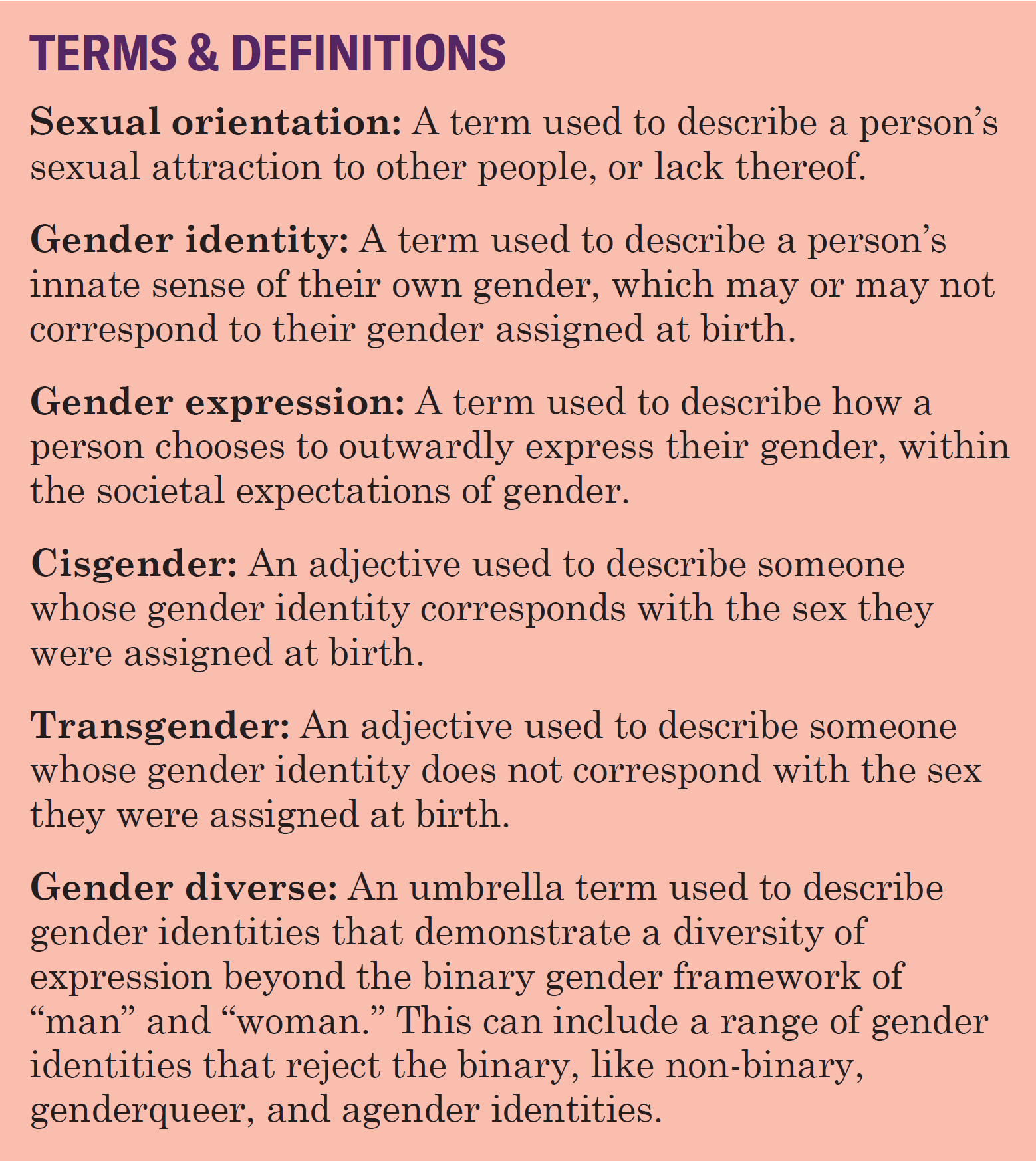
Of the LGBTQ+ Kansans that completed the survey, more than half (51.7%) had experienced discrimination in Kansas because of their sexual orientation, gender identity, or gender expression. The three most commons areas of discrimination reported were in healthcare (28.7%), employment (25.3%), and education (16%). These experiences range from intentional misgendering or deadnaming, to denial of services or care, to demotion or the loss of a job.
The survey responses tracked national trends that identified transgender and gender diverse people experience discrimination at higher rates than their cisgender LGBQ+ counterparts. Of the respondents that identified as cisgender LGBQ+, 31.7% reported experiencing discrimination in Kansas because of their LGBTQ+ identity. This number more than doubled for transgender and gender diverse respondents—65.2% of trans and gender diverse respondents reported experiencing discrimination in Kansas because of their LGBTQ+ identity. And of the respondents that reported experiencing discrimination in more than one area of their life, 80% identified as transgender or gender diverse.
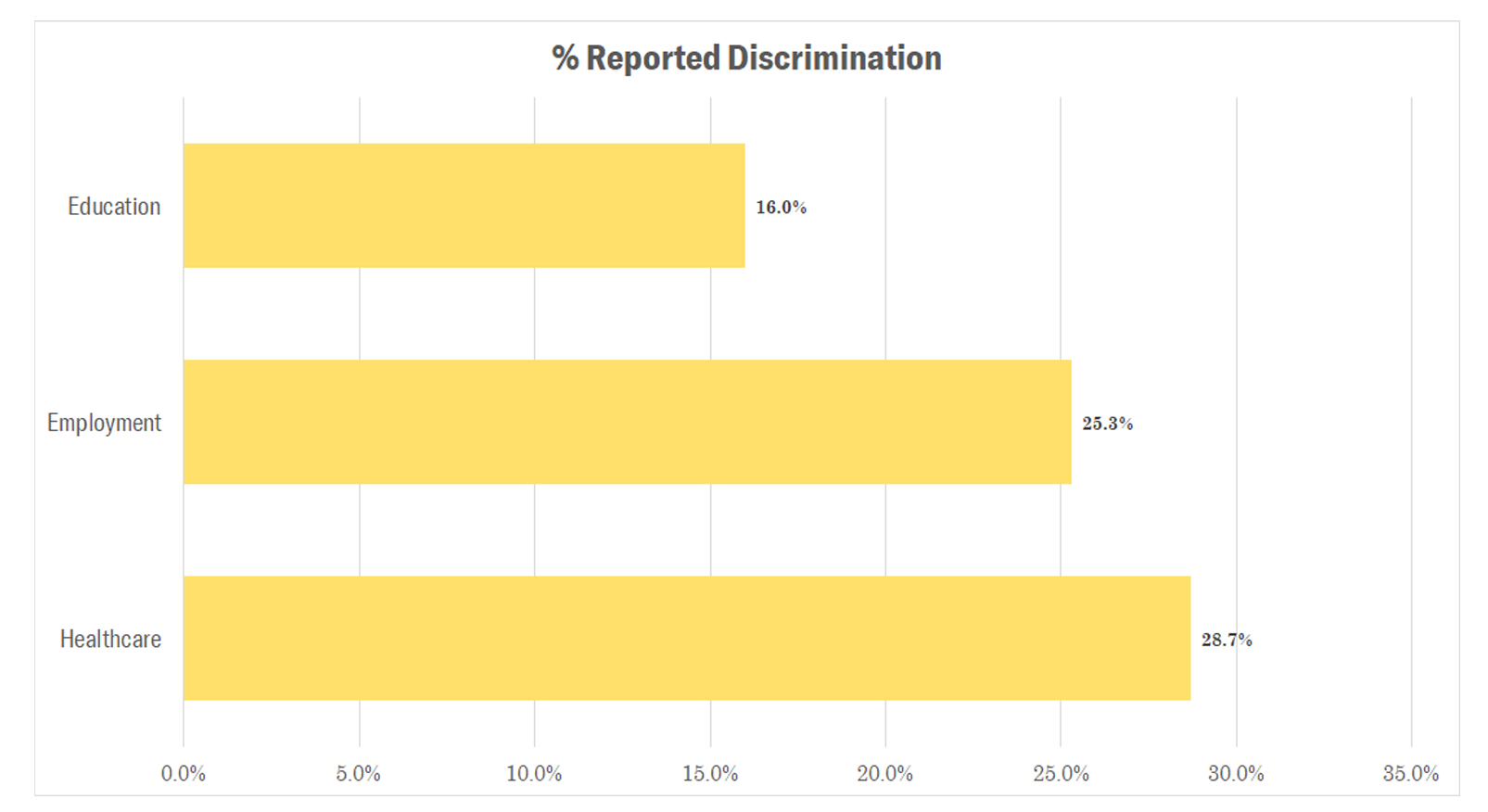
We asked respondents to provide context about the instances of discrimination they experienced in Kansas. The following are some examples shared by transgender or gender diverse respondents:
- “I have been laid off from a job, partly because they didn't like me being queer. I have a healthcare provider that doesn't use my pronouns and scoffed when I shared them. I have experienced transphobia in my classes, and it almost made me leave school.”
- “I was fired from [my job] because a patron complained ‘one of those people were interacting with children and other patrons.’”
- “I [am] currently in my Senior year of high school. They are trying to out transgender kids to their parents and not allow them to [use] the bathroom without going all the way across the school to the 1 of 2 gender neutral bathrooms.”
Community Connections & Safety
We asked LGBTQ+ Kansans if they felt safe and supported in various aspects of their life and in their communities. Most concerning, nearly one-third (32.2%) of LGBTQ+ respondents reported feeling unsafe and unsupported in their local communities. While majority of LGBTQ+ respondents reporting feeling safe and supported in their own home, of those who reported not feeling safe and supported at home, 83% were LGBTQ+ youth or young people (24 years old or younger). And of the LGBTQ+ respondents who attended a K-12 school or college/university, 25% reported not feeling safe and supported at their school. The reasons given for feeling unsafe and unsupported ranged from having non-affirming parents or peers, to experiencing public harassment by community members or service providers, to the increase in homophobic and transphobic rhetoric in their local communities and at the Kansas Legislature. A significant number of LGBTQ+ respondents also reported that they were closeted to their families or in their communities because they feared lack of acceptance, harassment, or retaliation.
We asked respondents who said they felt unsafe or unsupported in one or more aspects of their life to explain some of the reasons they felt that way.
- “It is uncomfortable and anxiety-inducing to try to advocate for myself in a medical setting when I am already trying to advocate for myself as a chronically ill disabled person on top of correcting pronouns and misgendering.”
- “People will tell you horrible things when you are transgender. I have been called a monster by a man sharing the sidewalk with me. I have been told by customers that I am disgusting and that they do not want me to contaminate their drinks. These people are usually aggressive and angry. My friends and coworkers do support me, but it is difficult to feel safe anywhere public.”
- “I’m not fully out to [my] parents, who would not be fully supportive of me. I’m also not fully comfortable discussing interest and options for certain hormone treatments due to the conservative religious affiliations and generally conservative community where my primary care physician is; I’m not confident I would receive unbiased and understanding medical advice. While I mostly feel safe and supported in my local community, as a gender nonconforming woman, a drag king, and someone who frequents queer bars, I don’t feel fully safe due to increases in violent rhetoric—and resulting physical violence, as with the recent mass shooting in Colorado Springs—targeting queer people.”
- “Even being engaged in my community and in community events and organizations, I feel a lot of loneliness and isolation. . .The LGBTQ folks I work with and for reflect and amplify that isolation. There is a discomfort with being out, and a discomfort with being an out professional. It is even worse for low-income LGBTQ people in the community—they lack resources and support to access the things they need.”
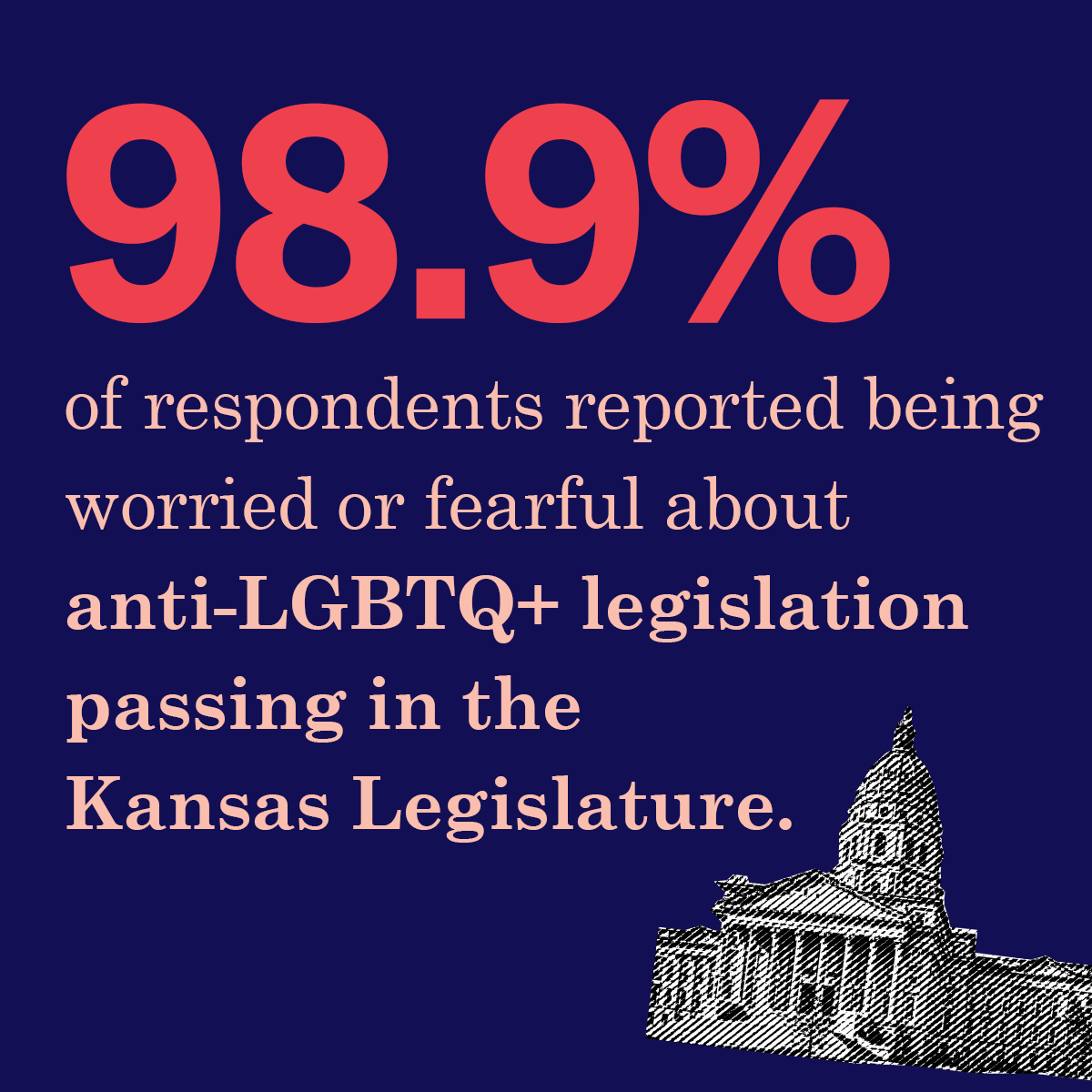
Needs & Priorities
We also asked respondents what their three biggest fears or worries were for themselves as a member of the LGBTQ+ community in Kansas. The most common response (shared by 98.9% of respondents) was that they were worried about anti-LGBTQ+ legislation passing in the Kansas statehouse. More than one-third of respondents were also worried about experiencing discrimination accessing healthcare or insurance coverage (36.8%), worried about their own safety or their LGBTQ+ child’s safety in their community (35.6%), and worried about coming out or living as their true selves consistently (33.3%). When asked what would help to address or lessen their fears or worries, respondents provided a range of ideas. But three main themes were clear: LGBTQ+ Kansans want more legal protections and better LGBTQ+ policies, more education for providers and community members about the LGBTQ+ community and their needs, and increased opportunities for connection and community building with other LGBTQ+ Kansans or LGBTQ+ organizations.
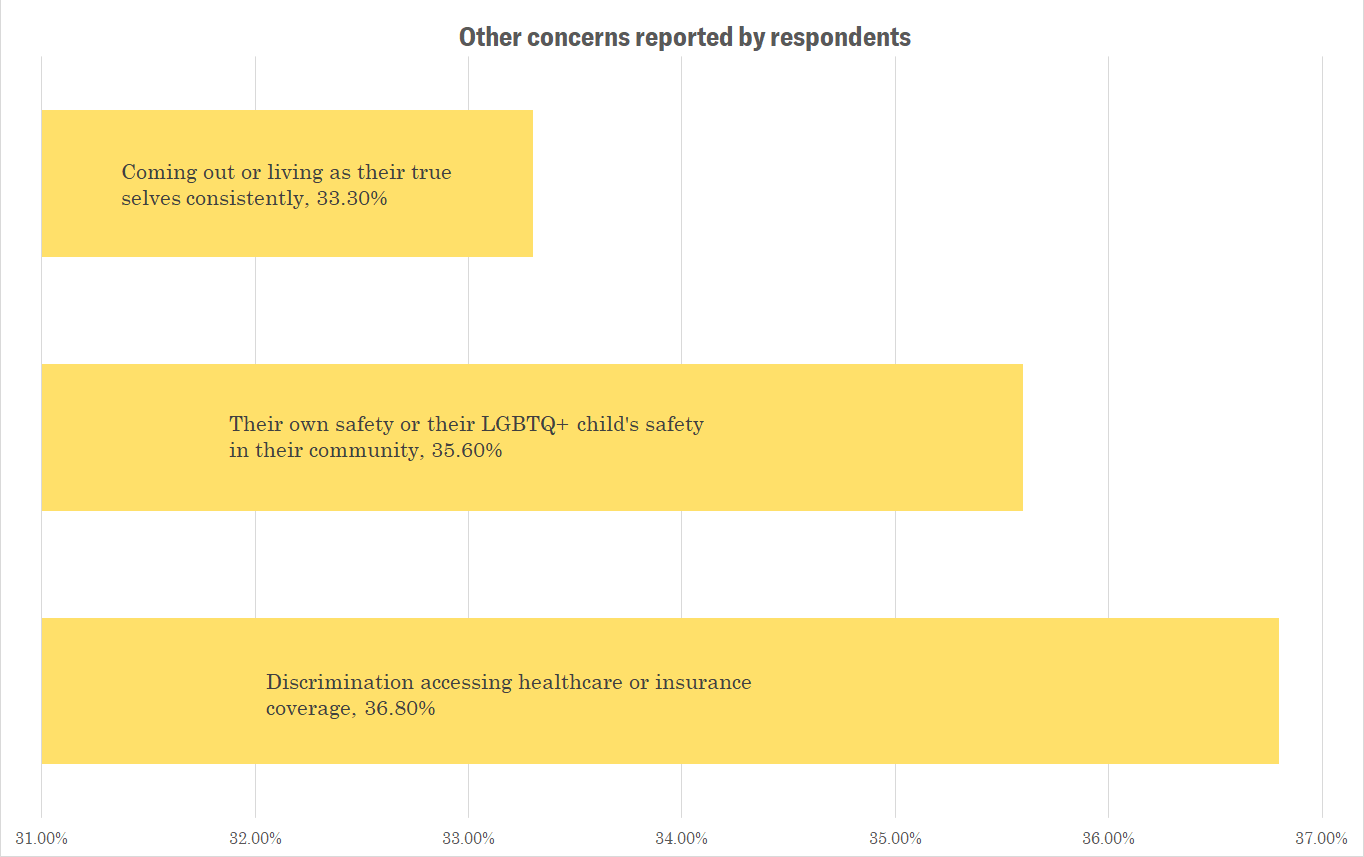
Resources
If you are an LGBTQ+ Kansan who has experienced discrimination, or you are an LGBTQ+ advocate in the state looking for resources, visit our LGBTQ+ Resource Hub to find ACLU of Kansas’ resources related to LGBTQ+ legal rights and protections and how to utilize those rights and protections.
1 See Lawrence v. Texas, 539 U.S. 558, 123 S. Ct. 2472, 156 L. Ed. 2d 508 (2003); United States v. Windsor, 570 U.S. 744, 133 S. Ct. 2675, 186 L. Ed. 2d 808 (2013); Bostock v. Clayton Cty., 140 S. Ct. 1731, 207 L. Ed. 2d 218 (2020).
2 See, e.g., Movement Advancement Project, Nondiscrimination Laws, https://www.lgbtmap.org/equality-maps/non_discrimination_laws (last visited Dec. 21, 2022).
3 Henry Berg-Brousseau, New Data Shows Support for LGBTQ+ Rights Continues to Tick Upward, In Contrast to Onslaught of Anti-LGBTQ+ Legislation in States Across Country, Human Rights Campaign (March 18, 2022), https://www.hrc.org/press-releases/icymi-new-data-shows-support-for-lgbtq-rights-continues-to-tick-upward-in-contrast-to-onslaught-of-anti-lgbtq-legislation-in-states-across-country; Belinda Luscombe, Public Opinion About Gender Identity is Increasingly Complex, Time (June 28, 2022), https://time.com/6191662/gender-sex-transgender-rights-pew/.
4 Matt Lavietes and Elliot Ramos, Nearly 240 anti-LGBTQ bills filed in 2022 so far, most of them targeting trans people, NBC News (March 20, 2022), https://www.nbcnews.com/nbc-out/out-politics-and-policy/nearly-240-anti-lgbtq-bills-filed-2022-far-targeting-trans-people-rcna20418.
5 See Madeleine Carlisle, Anti-Trans Violence and Rhetoric Reached Record Highs Across America in 2021, Time (Dec. 30, 2021), https://time.com/6131444/2021-anti-trans-violence/; Heron Greensmith, Violence Against Transgender People is on the Rise, Stopping it Requires a Holistic Solution, Just Security (Oct. 18, 2022), https://www.justsecurity.org/83597/violence-against-transgender-people-is-on-the-rise-stopping-it-requires-a-holistic-solution/; HRC Foundation, Fatal Violence Against the Transgender and Gender Non-Conforming Community in 2021, https://www.hrc.org/resources/fatal-violence-against-the-transgender-and-gender-non-conforming-community-in-2021; Laurel Powell, 2021 Becomes Deadliest Year on Record for Transgender and Non-Binary People, Human Rights Campaign (Nov. 9, 2021), https://www.hrc.org/press-releases/2021-becomes-deadliest-year-on-record-for-transgender-and-non-binary-people.
6 Julie Moreau, Anti-LGBTQ hate groups on the rise in U.S., report warns, NBC News (March 30, 2020), https://www.nbcnews.com/feature/nbc-out/anti-lgbtq-hate-groups-rise-u-s-report-warns-n1171956; Laurel Powell, 2021 Becomes Deadliest Year on Record for Transgender and Non-Binary People, Human Rights Campaign (Nov. 9, 2021), https://www.hrc.org/press-releases/2021-becomes-deadliest-year-on-record-for-transgender-and-non-binary-people.
7 See, e.g., S.B. No. 208 (2021), http://kslegislature.org/li/b2021_22/measures/documents/sb208_00_0000.pdf; Greg Payne, Shawnee City Council to take stance on transgender sports, KCTV 5 (Oct. 10, 2022), https://www.kctv5.com/2022/10/11/shawnee-city-council-take-stance-transgender-sports/; Rachel Mipro, Future of Kansas town’s library uncertain after outpouring of support at commission meeting, Kansas Reflector (Nov. 16, 2022), https://kansasreflector.com/2022/11/16/future-of-kansas-towns-library-uncertain-after-outpouring-of-support-at-commission-meeting/; Bek Shackelford-Nwanganga, Kansas school district bans trans students from preferred sports teams and restrooms, KCUR (Nov. 8, 2022), https://www.kcur.org/news/2022-11-08/kansas-school-district-transgender-student-ban-gardner-edgerton-pronouns; Rebekah Chung, Kris Kobach talks about his goals as the next Kansas attorney general, KSNW (Nov 21, 2022), https://www.ksn.com/news/capitol-bureau/kris-kobach-talks-about-his-goals-as-the-next-kansas-attorney-general/.
8 Movement Advancement Project, Kansas’ Equality Profile, https://www.lgbtmap.org/equality_maps/profile_state/KS (last visited Dec. 21, 2022).
9 See Christy Mallory and Brad Sears, Discrimination Against LGBT People in Kansas, Williams Institute (2019), https://williamsinstitute.law.ucla.edu/publications/lgbt-discrimination-ks/.
10 Id; New Report on Youth Homelessness Affirms that LGBTQ Youth Disproportionately Experience Homelessness, Human Rights Campaign (Nov. 15, 2017), https://www.hrc.org/news/new-report-on-youth-homeless-affirms-that-lgbtq-youth-disproportionately-ex.
11 Transgender Athletes: A Research-Informed Fact Sheet, University of Kansas School of Social Welfare, https://socwel.ku.edu/sites/socwel/files/documents/Transgender-Sports-Youth-Fact-Sheet.pdf.
12 See KAN. STAT. ANN. § 44-1001.

